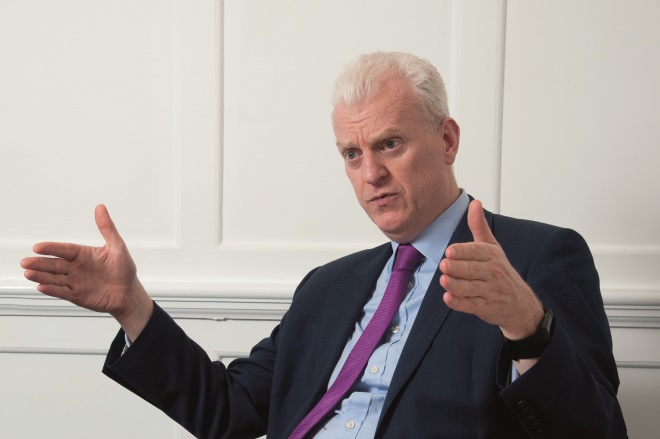
Charlie Milligan
Mark Lyonette is a very tall man. But even though he physically towers over most people he meets, pharmacists could be forgiven for not knowing his name. This is because Lyonette entered the world of pharmacy just six months ago. Since June 2018, he has spent that time quietly meeting with those in power and getting to grips with leading the National Pharmacy Association (NPA).
This is his first pharmacy media interview; however, as a former chief executive of the Association of Credit Unions, he seems well used to the trade press. The Pharmaceutical Journal visited the ivy-covered listed building that contains the NPA’s offices in St Albans, Hertfordshire, to find out his plans for the Association and its members in a time of such enormous uncertainty.
What was it like stepping into an organisation that was without a permanent chief executive for four years?
The role of a chief executive is to be that overview between the executive team and the board. If you take away that role, you lose that pivot point: there’s no single voice to listen to, and speak back to, the board.
We had a chair who was trying to play that role but it’s very difficult to do that as a non-executive. It’s an absolute honour to be coming into such a historic organisation at such a time of change for the sector. It feels like there are lots of threats, but there are opportunities too. It’s quite exciting to take on the organisation and serve our members and the board as part of that.
It’s critically important that we don’t assume one size fits all
What have you achieved so far?
I’m very new to pharmacy and healthcare so there’s been a lot for me to learn. I’ve been trying to make sense of how, as a membership body, we’re going to meet the needs of our members in this time of change for the sector.
We’re in the middle of agreeing the business plan for 2019/2020. It needs to deal with the big challenges — funding, technology and changing expectations of both the patient and the NHS.
How are we going to do that? It’s critically important that we don’t assume one size fits all. One of the challenges for trade bodies is that the small stay small and the bigger only get bigger. At the smaller end, single pharmacy owners are without a head office, so part of the NPA’s ambition is to provide them with some of the head office functions you might expect to get if you were part of a bigger group. At the larger end it’s a different relationship; instead, there are opportunities to coproduce things — whether that be technology, business tools or lobbying and providing advice.
The current funding situation with continuing clawbacks and increasingly volatile medicines prices is not sustainable
What would you like to see in the new community pharmacy contract?
NHS England has started some discussions with us about what it needs from community pharmacy in the medium and longer term. I suspect there needs to be much more work on this planning before a contract with any significant changes can be considered. However, in the short term, contractors are going to need to know very soon what is happening after April 2019. The current funding situation with continuing clawbacks and increasingly volatile medicines [prices] is not sustainable.
You’ll be aware of all the conversations that have happened over the years about how to get the best out of community pharmacy and use the full scope of people’s professional practice. These conversations are now starting to happen again and that feels very positive.
What are your main concerns for the future of independent community pharmacy?
There’s a lot of change going on and it feels like it’s all coming at once.
Funding is multiple in its challenges — there are the cuts themselves and being paid less, and there’s the uncertainty of knowing what you’re being paid at all when you dispense an item.
Technology is another big challenge — we absolutely recognise the value of technology, both in freeing up the pharmacist to do more clinical work but also in meeting patient expectations — they’re not going to wait around.
And of course the changing expectations of the NHS — what we thought the NHS wanted a couple of years ago is not quite what we’re hearing now. On top of all that, there are medicines shortages and Brexit — that’s a big set of challenges.
It’s vital now that we are not just turning up at the door and saying community pharmacy can do this for you; we also need to listen and respond by saying “how can we help?”
You have to judge that balance between upfront campaigning and having those quiet conversations — you need both
The Royal College of General Practitioners is campaigning to ensure increased investment in the NHS long-term plan — where is the equivalent campaign for pharmacy?
A lot of what we’ve been doing over the past few months has been silent. You have to judge that balance between upfront campaigning and having those quiet conversations — you need both.
We’ve been working very closely with the other pharmacy bodies in terms of submitting thoughts into the NHS long-term plan. Whether you’re corporate or independent, 80–90% of what you would want for community pharmacy is probably the same.
The challenges of the NHS and of finding a sustainable future for community pharmacy are so big that you absolutely could not rely on one organisation to deliver that on their own.

Source: Charlie Milligan
Mark Lyonette said: ”Our challenge at the moment is less about telling people what community pharmacy can do and more about listening to what the customer wants”
Does pharmacy need to be shouting louder?
I think the NPA has done a lot in putting our case forward. Our challenge at the moment is less about telling people what community pharmacy can do and more about listening to what the customer wants. But we need to go one step at a time.
I don’t think we can say to the government that we’ll do 26 new things next week. Building the ability for community pharmacy to do more will be a gradual process.
I think it’s very refreshing to have a secretary of state talking enthusiastically about the role of community pharmacy and prevention
Have you met Matt Hancock, the secretary of state for health?
I spoke with Matt Hancock at the party conference. I think it’s very refreshing to have a secretary of state talking enthusiastically about the role of community pharmacy and prevention, and it’s exciting to have him talk about the power of technology in terms of helping with the delivery of better patient care across the country.
We’re all waiting for the NHS long-term plan to be published and who knows when that will happen, particularly given everything else that’s going on with government at the moment. We’ll have to wait and see what it says about community pharmacy.
In 2018, the NPA reported that it was receiving more frequent calls about dispensing errors and patient safety — why do you think that is?
I don’t think we have any conclusive evidence. We have to be careful that it isn’t the result of general pressures in the sector. Some people say that actually not many pharmacies have closed, but an awful lot of things can be happening within a pharmacy before it eventually closes. Whether that’s the staff working longer hours, which ultimately comes at a cost to their health and potentially patient safety, or wages not being paid on time; all of those things are hidden.
I very much hope that those things are being monitored in terms of the potential impact on patient safety — you can only push people so far.
Do you think the government has done enough to prepare pharmacists for a no-deal Brexit?
This is a very difficult question. I don’t think it’s helpful for pharmacy bodies to be going out to the public to talk about our concerns. It panics patients and it causes the stockpiling that everyone is trying to avoid. So we’ve not been out there courting the press — but you shouldn’t mistake that for us not doing anything.
We’ve been talking, again quietly, with our partner bodies, the Department of Health and Social Care and NHS England about the challenges and suggesting some ways to make the best of what could be a terrible situation.
During my time in financial services I lived through the Northern Rock fiasco [during the economic crisis of 2007–2008] and saw what that did to the banking sector — [a no-deal Brexit] will impact on patients and their health.
Some of our members say that in the run up to Christmas patients worry that they won’t get the medicines they need. How terrible would it be if patients find out we’re running out of medicines? I think it’s a terrible situation and a big concern for all of our members.
Shortages appear to be on the increase, as is the severity of those shortages; we’re already in a very volatile market place. And it’s this very market place that has saved the country billions of pounds; but, in the current climate, what looked like a strength is beginning to look more like a weakness.
We’ve worked closely with the Company Chemists’ Association on SecurMed and we’re trying to make the best of what is a very difficult challenge
Are you happy with the level of information provided to pharmacists on the Falsified Medicines Directive?
We saw it coming a good while ago and have wholeheartedly embraced it.
We’ve worked closely with the Company Chemists’ Association on SecurMed and we’re trying to make the best of what is a very difficult challenge. It became evident recently that we don’t know what the future of the Falsified Medicines Directive (FMD) will be [in the event of a no-deal Brexit] — yet another big uncertainty that members are having to cope with.
I think we’ve done a good job in terms of information, but that’s not the same as saying everyone is completely ready for it. From what I understand, it’s not a trivial task to prepare for.
Are you concerned that community pharmacies have been slow to register with the Medicines Verification System?
No, not at the moment.
What about the lack of FMD funding?
That’s one for the Pharmaceutical Services Negotiating Committee to respond to. Did someone estimate £100m as the total cost of implementation? That’s not a small ask for something that doesn’t feel like it’s got a solid future. I always contrast it with General Data Protection Regulation (GDPR). GDPR was quite a well-known, nailed down set of regulations that you knew you had to get on with — that’s much easier to deliver on than something like FMD, where there are still moving parts and you don’t yet know where it’s going to land.
At The Pharmacy Show, I learnt that hospitals are hugely behind the curve on preparations for FMD. It’s not just community pharmacy; it’s a challenge.
Sometimes people think the NPA is opposed to online pharmacies, but that isn’t true
What is the NPA’s stance on online pharmacies?
Sometimes people think the NPA is opposed to online pharmacies, but that isn’t true; more than 100 of our members are registered with an online pharmacy.
It’s not the business model we have been opposed to; where we have complained is when we’ve seen people bending the rules and creating an uneven playing field.
We see bricks-and-mortar pharmacy as essential, and new services being piloted by NHS England — the digital minor illness referral service, for example — are going to rely on face-to-face interactions. But there is a role for online dispensing too. We need to make sure our members are able to compete in both spaces, not just in face-to-face ones.
When you find a disruptive model you always have to ask yourself what you’re going to do about it. If you’re going to survive you need to compete, not just complain.


